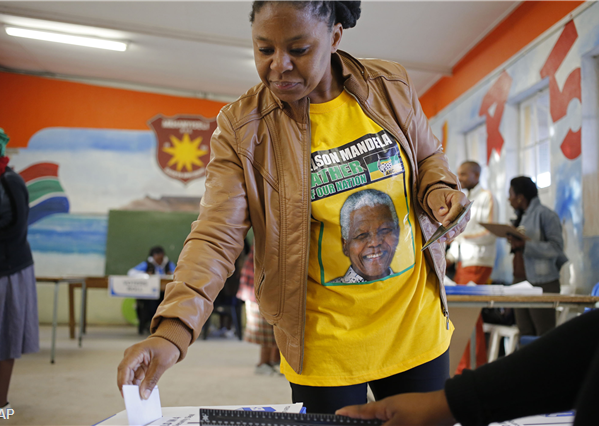
South Africa of today far from the ideal of Nelson Mandela

(Vatican Radio) Ballot counting in South Africa shows that the ruling Party, the African National Congress, has taken an early lead in the general election.
Partial results reveal that the ANC has garnered 62% of the vote, followed by the opposition Democratic Alliance at 24%
The Economic Freedom Fighters (EFF) party is in third place with 5%.
Turnout for the election was calculated at just over 72% with voting proceeding peacefully in most areas.
These elections are seen as particularly significant as they are the first to take place since the death of Nelson Mandela as well as marking the end of apartheid 20 years ago.
But serious economic problems, corruption, unemployment and lack of service delivery are just some of the issues that continue to plague the nation.
Reporting for Vatican Radio on the South African elections, David Maggiore asked Raymond Perrier, director of the Jesuit Institute in Johannesburg whether the economic themes will continue to be challenges after the election…
Listen to the interview…
Perrier says that all the economic problems that existed before the electoral campaign will continue to be major issues after the campaign and “I’m not sure that anyone feels that any party has come up with any proposals that really make a difference” he said.
He explains that one of the reasons that the extreme left EFF party has gained some interest is because it appears to have solutions, and even if they are not good solutions, Perrier points out that when people are so worried they are looking for any solution that might possibly work.
Regarding other issues the government will have to address, Perrier says South Africa has suffered very badly from the decline in its currency which has lost some 30% in two years. This – he says - has a huge impact on the cost of living, and South Africans are angry and frustrated because of this.
Another source of anger is the widespread corruption at all levels of society, but especially within the political classes. Perrier says: “the best way to address corruption is to address corruption, so electing as President (Jacop Zuma) a man who has been accused by the Public Prosecutor a man who has been accused of stealing public money, shows the party has very little genuine commitment to tackling corruption”. “They keep talking about it , but for as long as nothing is done about ANC officials, nobody believes they are serious” he said.
Regarding what is left of Nelson Mandela’s idea and ideal of the “Rainbow Nation”, the “new South Africa”, Perrier says that unfortunately one of the things that the ANC has shown in its years as the ruling party, is that it is “moving away from the vision of the ANC which was always a multiracial party, to a focus which is very much of it being a black party”. “That’s quite contrary to the vision of the ANC which historically was multiracial” he said.
Of the role that civil society and religious organizations can play in the development of society, Perrier says Churches continue to play an important role in the provision of education: “not big in terms of number but important in terms of showing that a public school run by a religious organization can deliver better results using the same budget as a public school run by the government, so it’s a good model of what can be done in service delivery” he said.
Raymond Perrier also points out that the Churches and particularly the Jesuit Institute have been particularly involved in encouraging people to vote reflectively: “not simply to just vote for the Party they have always voted for, but to think about the issues and think about what best serves the common good”.
| All the contents on this site are copyrighted ©. |


